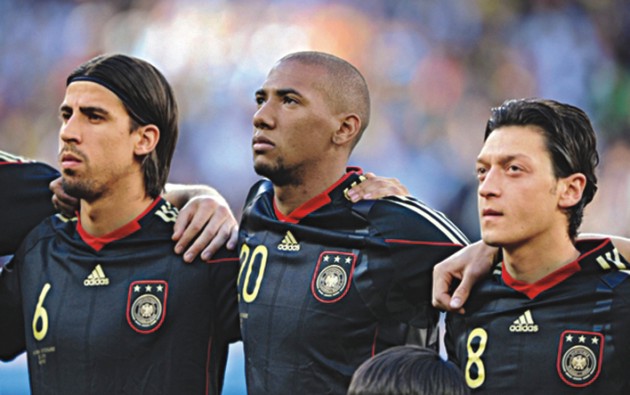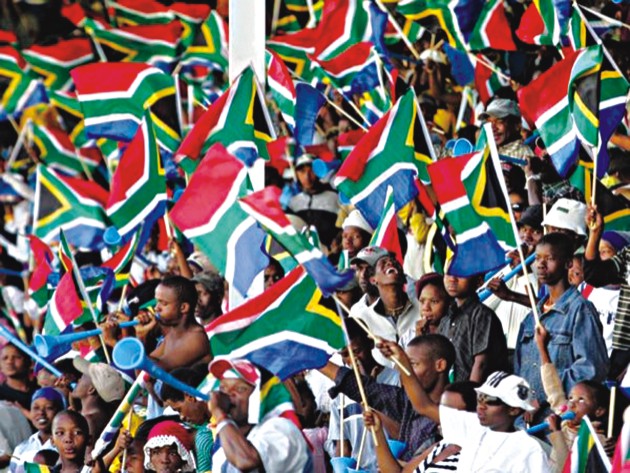
Inside
|
Nationalism's Last Frontier QUAZI ZULQUARNAIN ISLAM shows how multiculturalism in football is blurring the lines of nationalism.
It is June 11, 2008, a Wednesday, and the rain is absolutely pouring down in the Swiss city of Basel. Grey clouds swirl ominously above and beyond the open roof of St. Jakob Park stadium where supporters find every little bit of shelter that they can. Out on the pitch, however, hosts Switzerland are playing Turkey in a winner-take-all clash. This final game in Group A would determine who would make the quarterfinals of Euro 2008. Thus, despite the torrential downpour, the support is overwhelming and the action no-holds-barred. More importantly, given the circumstances, the tension is thick enough to slice with a knife. And there are the afters. The last time these two teams clashed back in 2006, the match ended in a mass brawl between the two sets of players. All this, sets up the game perfectly. But out of nowhere, Erin Derdiyok beats the offside trap and squares for Hakan Yakin to score. Switzerland are one up and the tension is somewhat alleviated. Minutes later the two combine again and Derdiyok puts Yakin through again. This time, however, Yakin inexplicably misses an open goal. On the replays it looks easier for him to score. But somehow he flicks it wide. The crowd is aghast and cannot believe it. But a select few shake their heads knowingly in a manner that suggests they expected nothing else. And the nods soon morph into full-fledged insults when, a few minutes later, Valon Behrami also contrives to miss the easiest of opportunities. It is all downhill from there. The rest of night descends into a series of catcalls and screams and it is no surprise then when the Swiss crash out to two late goals from a spirited Turkey side. The Swiss fans curse their luck and the weather which made conditions unplayable but the biggest retribution is saved for Yakin and many accuse him of intentionally missing an open goal. The reason? It is a jingoistic allegation and one that has no basis on facts but try telling that to the masses who lay the blame for their exit solely on the shoulders of Yakin. But what of Valon Behrami? He too missed a golden opportunity. This only gives fuel to their fire. Behrami may be turning out for the Swiss, they claim, but everyone knows he is originally a refugee from Kosovo. In truth, all these claims are absolutely nonsense. Yakin would no more have missed the open goal, than he would have sold his mother out. And he is no more Turkish, than Barack Obama is Kenyan. Yakin was born in Basel and he grew up in Münchenstein, a town along the French and German border. He is a Swiss resident and citizen and has played all but one of his active football years in the country. By all definitions, he is as Swiss as cheese and chocolate. But yet, in the minds of many fans, the doubts remain. But the truth is that in this day and age of globalisation and migration, the lines of nationalism are slowly becoming blurred. And nowhere is this as evident as in the game of football. This might sound like stereotyping, but the examples supporting this hypothesis are many. Or how else does one explain The Sun, with its war-riddled headlines, being the highest selling newspaper in England? The truth is that football is perhaps nationalism's last frontier. In the real world it is almost a dying philosophy. Even as far back as 2002, the British newspaper Independent concluded that, "…national symbols such as the Queen and the flag bear uncomfortable overtones of racism and colonialism. Patriotism," they went on, "is seen as profoundly down-market, like doilies and bad diets."
In football, however, flag-waving nationalism is widely acceptable. Nationalism in football is understandable, to a certain extent, especially when it concerns an international context. European Championships and the World Cup are competitions that are organised around the principle of nationality. Teams are composed of players with the same nationality, the national anthem is played and the national flag is displayed. Therefore, the organising principle of such competitions implies that nationality matters -- that it is a generalisation with substantive content rather than an empty stereotype. So arguably, every European Championship, World Cup, or even Olympic games does more to strengthen nationalism than to weaken it. Which is not really a bad thing; as long as it does not get very complicated. But, too often in football, simple flag-waving nationalism descends into chauvinistic and anti-foreigner behaviour. Multicultural teams are frowned upon and invoke debate and people like Hakan Yakin face allegations about their allegiance for their national side. It also explains how even people who give Fascist salutes are revered and regarded as cult-heroes for their clubs. Take the case of this year's World Cup in South Africa. Many others seemed to understand this view, but in reality it should be inexplicable, especially when you consider that this is the exact concern that was expressed by the National Party in Germany during the World Cup in 2006. A tiny Neo-Nazi group, they unfurled a banner showing 11 paper figures in Germanesque uniforms. Ten had brown, black, yellow or red faces. One had a white face. The words below read: "National Eleven 2010?" Here is how that transpired. So Tunisia, Turkey, Germany and Poland essentially combined to put Germany one goal up. Four of the five people involved were born in Germany, yet not all of those four represented them. Schwarzer chose Australia and while Podolski could have played for Poland, he never felt anything but German. Oezil was courted by the Turkish but he too stated that he has never felt anything but German. All this makes it very complicated for the average fan. And you can't help feel sorry for them. With the lines of nationalism so blurred, all they wish for are those days when names were enough to judge your nationality. For them, it's getting harder to argue that they are backing a country out of national pride when the lines of nationality on these teams are so blurred. And now, given all this disparity, how does he really root for a nation? It is easy to see why not. While national identity does add some spice to competitions like the Olympics and World Cup, in the larger world of politics, it's almost entirely destructive. We see it everyday across the world, from US, where ignorant Americans cheer as their military kills thousands of innocent Iraqis, to Serbia who committed vicious crimes in the name of patriotism in the old Yugoslavia. And the list could go on and on. But sport is different. Although many fans bring the same stupid violence to sport that they have been taught in politics, most have moved beyond such primitive idiocy. And the signs are bright. Not too long ago, club fans were wary of players who were not from the region that the club is based on. The general feeling was that they would never feel for the club as strongly as a "local lad" would. But this has slowly and steadily been erased, to the extent that many clubs now often field full teams that have no players from the country the club is from, much less the region. The feeling is now so limited that clubs often have icons that have no ties to the community or the region. Cesc Fabregas is Catalan, but who would argue that he is the face of Arsenal, a club from the north of London. Personally, I think multiculturalism is wonderful for football. People often like to pretend that it is a new thing but it is not at all the case. Recently, it has affected Germany the most in terms of destroying stereotypes, but sooner or later, all nations will experience the same thing. Multiculturalism brings fresh ideas and new styles to traditional systems and that can be nothing but good. And anyone who has a problem with naturalised citizens, Germans with Polish parents and French people with Arab names should really join the 21st century. This is the way of the future and they could do well to be part of it. Quazi Zulquarnain Islam is a football journalist. |

